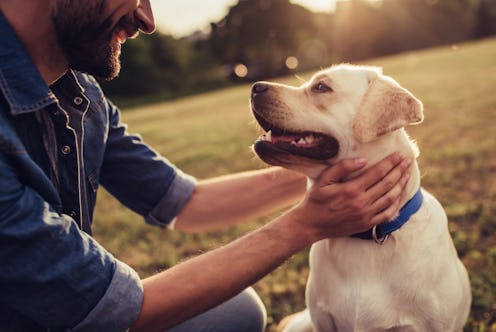Life
What To Do If You Think Your Dog Has Fleas

First, you might think it's cute that your dog is bent around into the shape of a pretzel, contorting to scratch an itch effectively. But when you slowly start to realize that the itch isn't isolated and your dog is trying to scratch off a full-blown flea invasion, it's not so cute. An unfortunate reality of being a dog owner is the extreme likelihood that you have to deal with fleas at some point. Dogs who spend time outdoors or in public places get fleas, and when that happens, you'll want know have some remedies for how to get rid of dog fleas safely.
While there thousands of over-the-counter products and devices that claim to kill fleas, not all of them have your pup's health in the forefront of their concerns. Some of the solutions that effectively kill fleas aren't great for your dog — and, in many cases the solutions don't do much at all, other than spread chemicals around your house. While fleas might seem like an external issue, they actually have the potential to cause more serious medical problems for your dog, and your home.
When your dog has a flea infestation, there are little open sores on their skin from scratching the bites. Some dogs have an extreme sensitivity to flea bites and they end up developing rashes too. When your dog's skin is left open and irritated, it leaves a gateway for other bacteria to enter your dog's blood stream. Imagine how you feel after a night outside getting attacked by mosquitos! For dogs, flea bites remain itchy and irritated until they are completely healed. So though a flea situation isn't necessarily life threatening in all cases, it's a emergency situation because if you don't contain it, you risk a home infestation and ongoing cycles or pest control and a very unhappy pup.
Here are some vet-approved suggestions for dealing with your dog's flea troubles, and ensuring that they don't come back:
Flea Bath Treatment
If your dog is doing a lot of scratching, take a look at their coat. If you see little brown dirt-like specs, particularly around the base of the tail (fleas love this spot) it could be flea dirt. Oh, and flea dirt is a PC way to say bug poop — yep, those little brown specs are combination of flea particles and flea waste. Flea bites, which you might notice on your own skin, usually look like small red bumps. If your dog is allergic to fleas, the bumps might be welt-like and inflamed. Upon noticing these signs, you'll want to give your dog a flea bath. This is basically a deep shampooing with a trusty product that has flea and larvae killing chemicals in it. This will only kill what's currently on the dog, but will not protect the dog from getting reinfected by fleas in your home, the second they get out of the bath. However, this will give them some immediate relief while you get the house in order.
Deep Clean
Everything that your dog has come into contact with needs to be taken outside, shaken out, and then cleaned with hot water and soap. The dog bed has to go in the wash, the couch cover needs to be steam cleaned or machine washed, the carpets and rugs need to be vacuumed and every corner of the house needs to be scrubbed — including your own bedding. Plush toys that can't be washed unfortunately need to be thrown away.
Flea Preventative
Once your pup is clean and dry, you'll want to give them either topical flea medication and prevention, or a pill. Call your vet to see what they suggest for your breed first. This medication will help to keep your dog flea-free and will kill anything that was left behind from the bath. This treatment needs to be re-administered every four to six weeks, check with your vet for instructions.
Vet Check-In
If you still notice that your dog is itching and scratching after 48 hours, you should bring your pup in for a check up to make sure that it's not something else. If conditions worsen or your dog seems to have a reaction to the medication, don't wait, take your dog to the emergency vet immediately. Not all dogs reaction flea medications the same way, just in the way that they don't all react to flea bites the same way. Never do anything without checking with your vet first regarding flea preventative brand and dosage.